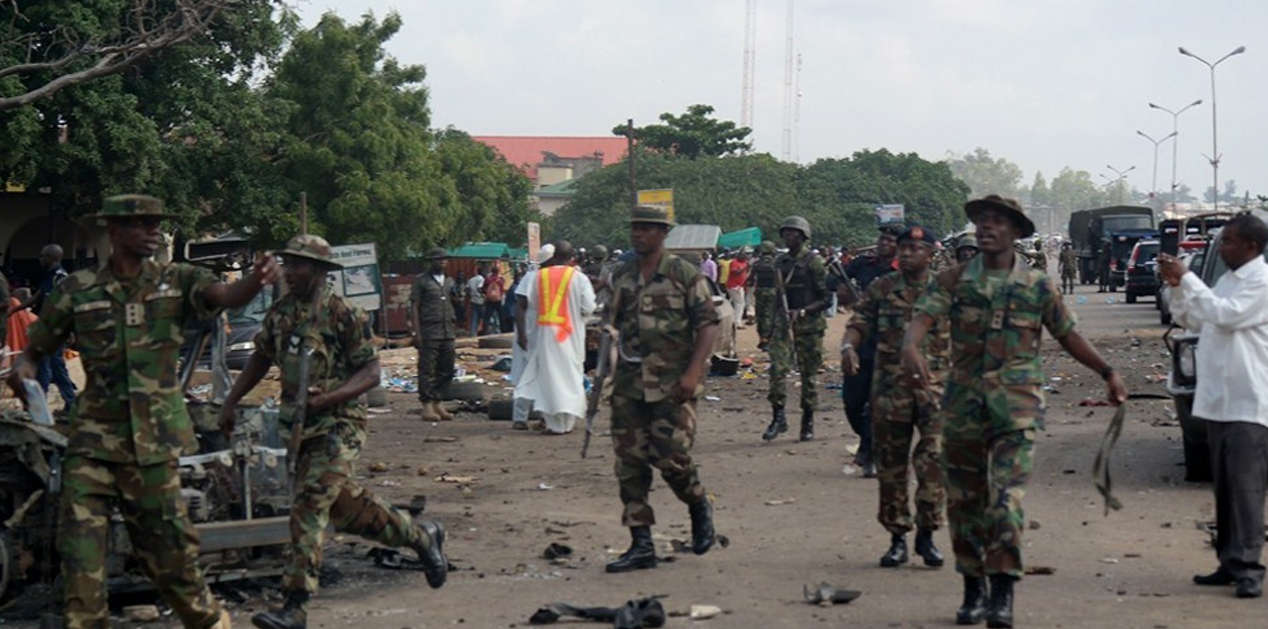After six years of deadly Islamic insurgency by Boko Haram which has caused more than 20000 civilian and military casualties so far, finally Nigerian Army in cooperation with forces from Benin, Chad, Niger, and Cameroon seem to get some success in their military campaign against the extremist group.
Boko Haram which was holding swathes of territory in north eastern Nigeria’s Borno, Yobe and Adamawa state last year has lost control over much of the part it had seized.
Buoyed by the measures taken to wipe out corruption and mismanagement of funds earmarked for the Nigerian Army to confront Boko Haram by the newly elected President Mohammadu Buhari, the Nigerian army has been successful in recapturing the towns in North eastern Nigeria ones held by the Boko Haram in their bid to create an Islamic caliphate. The Multinational regional force consisting of 8700 strong army has proved successful in restoring the order in the towns which witnessed Boko Haram’s barbaric rule with imposition of Sharia last year.
Though Boko Haram is not as potent as last year when it seemed the group is on the verge of establishing an Islamic Caliphate, the threat is far from over. Boko Haram, it may be recalled had faced a serious setback in July 2009 too, when a Nigerian crackdown on the outfit saw more than 1000 members of the group being killed and their founder leader Mohammad Yusuf summarily executed by the Nigerian police.
However, even after the 2009 drubbing from the Nigerian authorities, the group hunkered down in the remote areas of Mandara Mountains and Sambisa forest which provided it ample time to retreat and regroup only to reemerge as a deadlier force. There is a growing possibility that in wake of recent serious setbacks the group is facing, it may revive its old strategy of guerrilla warfare were it will carry out sporadic attacks causing destruction and casualties. Boko Haram is also likely to use suicide bombings as an effective tool.
Looking at the tactics of Boko Haram in the past, it is highly likely that Nigeria and other bordering states like Cameroon, Chad and Niger may well witness a series of suicide bombings. In fact, in the first three months of this year Boko Haram has carried out many suicide attacks in Northern part of Nigeria and in Cameroon and Niger as well. In a suicide bombing on 29 January this year, a 12 year old blew himself up in the city of Gombi at a grain section of a International market which saw 11 people being killed. Even before this attack, Boko Haram fighters’ raided two remote villages namely izgeki and izghe, where the Boko Haram fighters killed scores of people. One of the fighters even blew himself up killing those who were trying to escape the attack.
The porous border between Nigeria and its neighbouring countries namely Niger and Cameroon allows the group to inflict violence in the bordering parts of Cameroon and Niger, this is evident from the fact that this year alone parts of Niger and Cameroon bordering Northern Nigeria have already seen scores of suicide bombings and hit and run raids by the Boko Haram insurgents. On January 13 this year, suicide bomber blew himself up inside a mosque at Kouyape in Cameroon killing dozen people.
Most of the suicide bombings have taken place in the bustling markets of various towns and villages, thus Boko Haram facing a serious setback wants to inflict maximum violence and subsequent causalities by targeting market places where large number of people gather. Boko Haram is also trying to hit Nigeria’s economy hard with use of suicide bombings thus worsening the situation in the already economically impoverished region in the Northern Nigeria. This is evident from the fact that, in light of growing threat of Suicide bombings, Nigerian military recently forced closure of one of Africa’s biggest cattle market in the city of Maiduguri, which also happens to be the birthplace of Boko Haram.
Military has accused that sales of stolen cattle’s are being used to finance Boko Haram’s fighters. The closure of market in Maiduguri and many other such markets in the country’s northern part has resulted in thousands of people losing their jobs and creating shortage of beef across the country.
It therefore appears that Boko Haram has decided to use suicide bombings as the best tool to inflict maximum possible violence and thereby causalities, without causing much loss to the group. In light of the recent setbacks Boko Haram would prefer to keep the casualties of its own fighters low. Suicide attacks would also further continue to expose weakness and vulnerability of Nigerian Army and government since it does not have the expertise and ability to prevent suicide bombings. Suicide bombings appear to give the terrorist group maximum publicity and undermines Nigerian governments claim that the group is being decimated.
Thus it is likely that in the months to come Boko Haram may well resort to sporadic attacks including suicide bombings, hit and run raids on remote villages which are close to Sambisa forest and Mandara Mountain range hideouts. Boko Haram is also likely to target towns and villages in Cameroon and Niger bordering Nigeria. Such tactics may well be used by the group to buy time to retreat and regroup by hunkering down in Sambisa Forest in the wake of series of setbacks the group is facing from the strong regional force.
Published Date: 26th April 2016, Image Source: http://www.dailymail.co.uk
(Disclaimer: The views and opinions expressed in this article are those of the author and do not necessarily reflect the official policy or position of the Vivekananda International Foundation)










Post new comment